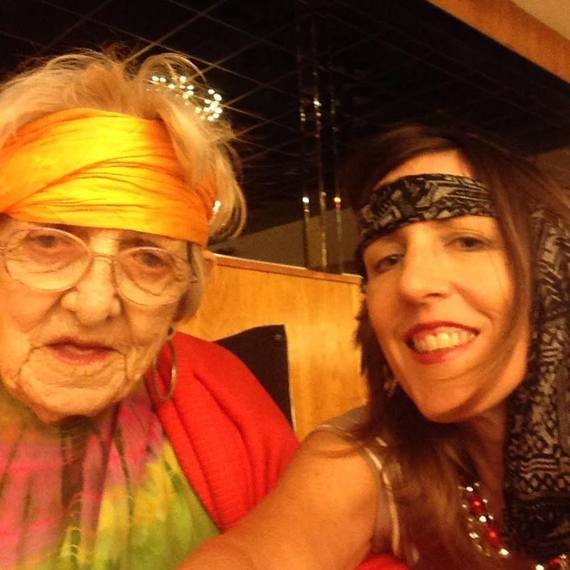My cousin's wife of two years sat outside my grandmother's door with me and listened to my thoughts on death through my veil of migraine pain. It was day eight of the bedside vigil, and it was the first day I was starting to feel it -- the stress and pain of holding back grief, of trying to act normal. It was easier to talk to someone who wasn't blood, who could listen and not interrupt. No one wants to talk about death but I started to force the conversation because my grandmother was starting to die even though we were denying it. She's 101 and wants to go "home." She's been saying she's been dying for 20 years, and even more over the past four years since she's been in a nursing home. But she'd say it while making plans the next day and ordering people around and having a shot of Southern Comfort -- even in the nursing home.
No one wants to talk about death but I started to force the conversation because my grandmother was starting to die even though we were denying it. She's 101 and wants to go "home." She's been saying she's been dying for 20 years, and even more over the past four years since she's been in a nursing home. But she'd say it while making plans the next day and ordering people around and having a shot of Southern Comfort -- even in the nursing home.
She'd say she want to die but she had too much worrying to do about this son or that cousin. She's been the patriarch of our family for so long, it's hard to imagine not having her to complain to, seek advice from, borrow a $10, buy her a lottery ticket. She's the family hub. Our large Irish family always crossed paths at her Hoboken brownstone; now it's at Fritz Reuter. She is where our family comes to gather.
But now when she says she wants to die, it's different. She says she is dying and anyone can see my grandmother at 101 is way different from when she was 100. Anyone who has spent any time with her over the past 20 years would even see it immediately. And anyone who hung out with her all the time like my cousins and I did these past four years, well, there's no denying the major shift. My grandmother -- still witty and trying to read my iPad two days ago -- started to change as her body started to slowly shut down. Even she didn't know at first what was going on.
About three weeks before death started to set in, she told me she was terrified she was going crazy, that her mind was playing tricks on her on her. I brushed it off until she called me crying to come see her and "straighten her out" -- she didn't know where she was and had forgotten she went out to lunch that afternoon. Once she saw me, and I reoriented her to her surroundings, she seemed perfectly fine.
The next day, however, she's holding on to me in terror, crying what happens if her body outlives her mind, then what? She really felt like she was going crazy and didn't know what was happening to her. She was so very scared. I stayed with her that night not knowing it was the start of a deathbed vigil, not knowing how important a role I was to become in my grandmother's life.
I didn't have to do a lot of research to discover she wasn't getting dementia, it was delirium -- sudden and fluctuating states of restlessness, illusions and incoherent thoughts and speech. It's terrible at night and I found out she had been asking the aides to sit with her when she woke scared; no one knows how long it had been going on. She was offered medication but turned it down, fearful it would make her feel even more crazy during the day. Since this was a woman who wasn't even on blood pressure medication, I wasn't about to push pills, night terrors or not.
Quality of life with family is important now, and like a new mother nesting, Grammy has sudden requests of everyone and a need to get things -- real and imagined -- put in order. She wanted to say goodbye to everyone, and tour every inch of this building. She's had random requests for food she doesn't normally eat, and insisted on having a new telephone. She asked my dad for a meatball. She suddenly hates coffee and wants pineapple juice.
Death is a process not unlike birth. There are signs when it starts to begin, that now, in hindsight, were clear a few months ago, and got clearer and clearer as we got closer to this point. There's no denying it, and once the process has begun, there's no turning back except for tubes and machines. She has a DNR. Her wishes are clear and she's never wavered.
My grandmother asked me to stay with her until it's over, and I can only think of a few reasons she'd ask me: She knows I'll talk about anything and won't mince words; she knows I will do anything for her if I'm able; and she know I can be a calming presence. It took me a very long time to become a calming presence; it's still a daily practice.
My grandmother is a demanding woman, but at the same time doesn't like to impose too much. She must really need me here, and perhaps knows I need just as much, to be here as well. I haven't yet begun to process this woman not being in my life. Knowing I am spending every last day with her is something I will never regret.
Earlier on Huff/Post50:
